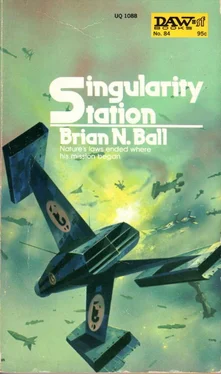When the blast of the explosion sent a shock wave through the cell-deck, Liz Deffant was already in the lower hold. The noise came to her only faintly. Events had happened so fast, that she had had no time to absorb them. She looked about the bright, cavernous deck, with its rows of gleaming survival-pods, and all was so calm and silent and orderly that she could almost believe she had suffered a phantasmagorical experience. She closed her eyes for a moment.
It was all true. The nightmare was real. She shivered and called out.
It was Al Buchanan’s name she called.
She tried to order her thoughts. She saw again the two robots advancing on Maran. Almost, it had been over. They had advanced and then slowed to a puzzled creeping motion. Their tentacles were ready to pinion him, and yet they had halted. Maran’s terrible genius had stopped them. Maran had won, she told herself. But Rosario? Where was he? She had heard him trying to convince the machines that Maran was the danger. He had appealed to them. And all the time, she had been rigid with shock. Why could she not have moved—acted—thrown herself at Maran?
She breathed in shallowly. She was acutely conscious of small sounds that had not been noticeable before. Gentle soft noises. Remote systems pulsating. A distant, heavy jolt from the drive. Behind paneling, slithering, movements.
She experienced a moment of panic. She realized that she might be alone. If the ES 110’ s crew had not yet sought her out, if Rosario had not yet come for her, then they were helpless. Perhaps, by now, they were dead. Then there had been the thin whipping sound as she left the grav-chute…. She was in a torment of indecision and frustration. She looked about the hold. Scores of cylinders flanked the cavern. At the far end a small console stood. In the recess behind it, she saw what looked like a space-lock.
She began to feel a bitter anger. Maran was a throwback to the days of the Mad Wars. He had shown no compunction in sacrificing the lives of the Security men nor the prisoners. Expellees his victims might be—people who had offended so vilely that they were intolerable—but they were human beings. Death should not some so horribly. They should not die so, poisoned in the ooze. With anger came determination.
What could she do? She was a resourceful woman, but she recognized that she was in a totally unfamiliar situation. Her framework of experience was narrow. She was an ecologist. She had never faced a real danger to her continued existence in her years with the Bureau. And now Maran threatened more than herself.
Maran was in control of a powerful Galactic Service vessel, with all its systems of decision-implementation. She was one person, helpless, unskilled in cybernetics. His sublimely creative mind, which had devised strategies for circumventing the elaborate safeguards of the ES 110, was a danger on a colossal scale.
The calm words of Rosario came back to her. A Red Alert. That had been the essential thing. Warn the Enforcement Service patrol-cruisers. Warn Center. Tell them Maran was loose. But how?
To allow Maran to continue unopposed was unthinkable. To return to the cell-deck was to invite the fate of Tup and the Security guard. What could she do? Soon, Maran must consolidate his hold on the ship. He would send out the robots to determine her whereabouts. There would be a little time, probably, before Maran regained his strength. On the cell-deck above, the robots were preoccupied. Until she saw her way clear, she must bide.
But what would that accomplish?
She looked at the nearest survival-pod. Memories straggled for expression. Her determination was growing to an angry resolve, one that could even face the inconceivable. She must halt Maran. Even if it meant returning to the green-lit hell above, she must go back.
She turned to the grav-chute. It gleamed invitingly. But her blood turned to ice and she could not move toward it. She despised herself with a cold fury.
A noise somewhere behind the tall, white cylinders brought her wheeling around. There was movement. Not the noise of servo-systems. Slow, dragging movement, irregular and bleakly menacing. Liz opened her mouth to scream. She could visualize Maran’s massive head, the straining eyes, the ooze-clotted heavy chest. The movement stopped. Whatever was behind the cylinders had sensed her presence.
She backed away.
Then she heard the harsh note of agony. She dared a look back.
She saw a hand, an arm. The rest of the man—it was a man—was concealed. A runnel of blood began to creep from below the cylinder. Liz was poised, either to run or to return. Pity won. She went back slowly. She saw Rosario’s head, with the long wound that was the source of the blood. In the side of the hold, a narrow panel gaped. There was no movement within it. Nor the least sign of movement from Rosario.
“Jack,” she whispered. “You came through that?” He had climbed down some kind of tunnel to reach the hold. She flinched as she turned his head gently. She looked at his body. One arm was bound loosely to his side. The other was stretched out in mute appeal. She had seen serious injuries before. This man needed immediate expert medical attention. Her first thought was that there would be a surgical unit aboard the ES 110. Rosario needed all the care he could get. He might be dying.
She listened for his breath.
There was little enough of it. Liz gulped down a rush of hope. Rosario had opened his eyes.
“I’ll get help—”
“No!” His voice was surprisingly strong. “Listen!”
Rosario’s head fell back, a dead weight. Even his iron will had its limits. Another change came over Liz Deffant. First there had been a helpless terror; and then a vague determination that Maran should not be allowed his triumph; now, determination had turned into a clear resolve. She could plan, actively plan. She had remembered something, something that had been swimming in the back of her mind since she had run blindly for the lower deck. But first, Jack Rosario.
Buchanan felt the station sink down a shaft of strange energies. A skein of hypercubes shimmered dimly on the operations screen. Then they flared into blistering radiance.
“Report!” he ordered.
“Emissions from interior of Singularity increasing in strength,” said the robotic controller from its conical pedestal. “Associated discontinuities at edge of Singularity, Commander.” Buchanan snarled suddenly: “I can see that—explain them!”
“Not possible, Commander. The scanners cannot range on the inner core.”
“Then range on anything— anything that shows up!”
“Yes, Commander.”
Buchanan threw the sensor-pads away. They gave him information, but they did not accept his orders. But they would! When the station was affected by the Singularity’s weird powers, then the overrider would come into effect. The ship would be his!
He almost missed the sudden image.
“Ships!” Buchanan yelled. “ There!”
At first he thought he had suffered an hallucination, for the ships—so many of them—seemed to wave and rock as if caught in subtle, shifting eddies. And such ships!
Tiny rocket-craft; here and there a minuscule scouting ship. One giant interstellar colonist ship from the first days of Galactic exploration.
And all of them caught in the writhing coils of the Singularity, all trapped, lost, held cold, dead, forgotten. The image of the big screen faded even as he spoke, but he had seen them. Yes! Maybe not the ship—the one he had come to seek, but certainly ships.
A whole Sargasso Sea of wrecks, held in tenuous force-bands, where they hung in a strange thermodynamic balance—hung by thin timeless tendrils within the eerie depths of the Singularity. Hung in shimmering white-gold tendrils.
Читать дальше












